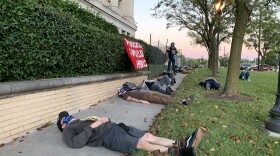Baltimore City schools administrators released Wednesday a plan to bring back a group of students that includes the district’s most vulnerable to 25 schools starting in November. In a town hall Thursday night, parents and teachers raised many questions and concerns to those administrators.
“Why do families have a choice [to return to the classroom] but teachers and staff don't?” asked one commenter on a Facebook livestream. “If my child decides to continue to do virtual learning, will they have the same teacher?” asked another.
City schools CEO Sonja Santelises and other leaders fielded questions, while emphasizing their decision stems from “prioritizing students in some of the most vulnerable or challenging categories.”
The plan gives students in pre-kindergarten, kindergarten, special education, English learners and those experiencing homelessness, as well as those who have missed at least 20% of online classes, the option to receive in-person schooling in the district’s second quarter, which starts Nov. 12.
Sixth and ninth grade students, who are transitioning to middle school and high school, respectively, and students in hands-on career technology classes will also have the choice to return.
The district will require some, but not all, pre-kindergarten and kindergarten teachers, as well as teachers of students with special needs, to return. Teachers with medical conditions that make them more susceptible to COVID-19 and childcare concerns may be eligible for accommodations or leave.
“Virtual learning is not working for pre-K and [kindergarten] students whose families are frustrated, for students with disabilities who are just not able to get the support that they need virtually,” Santelises said, adding that some teachers have reached out to her saying they are ready to return to classrooms.
Santelises said the partial reopening is intended to be steady and measured. “We're not saying ‘Open up the whole district,’ ” she said.
The official list of 25 schools that will host students is not complete, schools spokesman Andre Riley said, though some have approached the district. Some schools have unofficially announced plans to reopen, such as Patterson High School. Teachers may shuffle around as classes are determined.
One widely shared worry from town hall participants was safety protocol, such as the distribution of PPE and face mask. The issue has been a chief concern of the Baltimore Teachers Union, which has argued that school buildings, some of which lack air conditioning and were not properly stocked with soap or water before the pandemic struck, are not safe for staff or students.
“Why should anyone trust that the system is finally going to provide adequate cleaning and maintenance of the school buildings?” teacher Michael Newhouse asked in a Facebook comment.
Lynette Boswell Washington, city schools’ COO, said the district has invested in an abundance of cleaning supplies and will lean on established safety protocols from summer in-person classes, such as mandatory face masks. The district has also hired additional custodial staff to disinfect shared spaces, she said.
“I am confident that we have enough supplies and that we're using this period of time to continue to gauge how much more supplies we will need as we open,” Washington said.
And when it comes to contact tracing and monitoring symptoms, city schools chief of staff Alison Perkins-Cohen said the district means business. Students in group pods at current in-person learning centers sit more than six feet apart from each other, with desk shields.
“That pod does go home any time anybody has covid-like symptoms,” Cohen said, “either the quarantine window passes or until we get a negative test back.”
Many parents asked if teachers lowered their curricula’s lessons and standards due to online learning. Chief of schools John Davis said that is not the case.
“At the same time, we do have to acknowledge we are in that virtual space, and so I think covering the same amount of curriculum is going to be a challenge,” Davis said.
“I don't want to act like it's just the norm or it's just as easy as it is in brick and mortar,” he said.
“Our teachers and our principals are working really hard for us to make it rigorous. But we also know just life is rigorous right now.”
If parents don’t think their children are challenged by their online learning, they should reach out to a school principal or teacher, Davis said.
Officials also acknowledged they are still ironing out some reopening details.
“You'll hear more and more from our schools as they are preparing to roll these things out,” spokesman Riley said.






